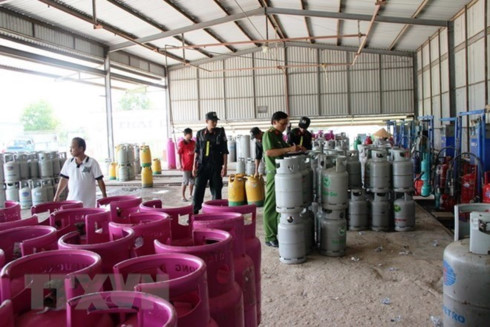Gas trading violations affect businesses, consumers
Some gas trading firms illegally take gas cylinder shells from other companies, then remove the label on the tank and attach their own to sell to consumers.
A representative from the Market Management Department under the Ministry of Industry and Trade recently said that unhealthy competition in the trade of liquefied petroleum gas (LPG) has remained and destabilised the market, affecting the interests of consumers, organisations and individuals with legitimate trading activities.
Since October 2017, market management forces have conducted inspections on 2,359 cases, handling 643 cases and seizing 1,781 gas tanks and 15,546 mini gas cylinders.
They have fined establishments with administrative violations totalling VND4 billion (US$177,700) and suspended the operation of 10 shops. One case was transferred to police for criminal investigation.
Recently, the Hanoi market management team checked a truck and discovered 639 gas cylinder covers with the original labels and valves removed.
 |
| Police in the southern province of Tay Ninh inspect a gas storehouse of Thai Duong Manufacturing-Trading Ltd Co. |
This is not the first time that functional forces have detected the gas tanks of reputable companies in the wrong hands.
Previously, the Police Department for Smuggling Prevention (C74) under the Ministry of Public Security (MoPS) and market management department in Hoa Binh province inspected the gas extraction base of Phuc Khang Petroleum Gas Ltd Co and found that the firm was using hundreds of gas cylinder shells under the brand names of Petrolimex, Total, Dai Hai, Shellan Gas, Siam Gas and Vinashin Petro.
At the time of inspection, this company could not show legal documents for using the gas cylinder covers of other companies.
Head of the MoPS’s Market Management Department Trinh Van Ngoc said that violations on gas trading have increased sharply.
Establishments and individuals mainly collect gas cylinders and remove the labels or take gas shells from prestigious brands then refill them with gas to sell to the market.
These gas cylinders were still sold in markets without any tests on fire safety, he said.
To avoid police checks, firms used vacant land away from residential areas to extract gas from gas vehicles into gas cylinders, said Ngoc.
According to Doan Trong Tha, from the Gas Association of Vietnam, every year, gas trading enterprises lose over one million gas cylinder covers. Each cover costs about VND450,000-VND500,000.
Meanwhile, the company taking covers from other companies spent just a few thousand VND to turn it into a new one. It revealed that reputable gas trading businesses were losing a huge amount of money, he said.
In fact, the illegal gas extraction is happening frequently but the handling of violations is only administrative sanctions, and that is not enough.
Handling of violations in gas trading is difficult because it is a specific business activity that is similar to the petroleum business but not yet managed by regulations in petroleum trading, said Major Nguyen Van Thuc from C74.
Many of the sanctioning decrees were out of date and not suitable with market movements, so they were not enough to deter violations, he said.
Therefore, the functional agencies should work to improve the law in this sector, creating conditions for healthy competition in the market, he added.
Deputy Director of Hanoi’s Market Management Department Nguyen Dac Loc said that the authorised agencies should resolutely deal with small gas business establishments which lack trading licences and do not ensure fire safety conditions.
At the same time, the agencies should regulate specific responsibilities for local authorities in the management of gas trading in the area, Loc said.
More decrees were also needed to fix shortcomings in the current decree, including a focus on regulations to ensure safety, health and rights of consumers, and was the foundation for State management agencies for post-checks, he said.

